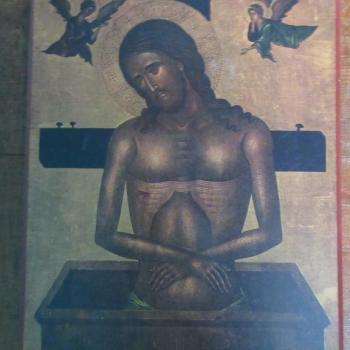Vainglory is a sin which easily traps the one seeking a life of virtue. It takes what is good, the pursuit of virtues, and turns it in on itself; it takes virtues and turns them into vices. Just because what one does, in an objective sense, is good, does not mean there is no sin. Indeed, those who do not reproach themselves in their pursuit for glory, and instead, accept the flattery and praise given to them by others will find their sins are greater than those they often mock for not being as active in pursuit of the virtues. Satan was the greatest of the angelic choirs, and he fell due to his self-love and became the greatest spiritual force for evil in creation. He can still appear as an angel of light; he knows how to use the virtues for evil, and those who ignore the holistic relationship of the virtues, one to another, are his prey:
A vainglorious man is a believer – and an idolator. Apparently honoring God, he is actually out to please not God but men. To be a showoff is to be vainglorious, and the fast of such a man is unrewarded and his prayer futile, since he is practicing both to win praise. A vainglorious ascetic doubly cheats himself, wearing his body and getting no reward. Who would not laugh at this vainglorious worker, standing for the psalms and moved by vainglory sometimes to laughter and sometimes to tears for all to see? [1]
The cross teaches us the path of salvation is the path of self-giving, of denying the self.
The cross is the weapon of salvation, for it overcomes our enemies – the spiritual foes which would divert us away from love. It is “the weapon of peace,” for it conquers by converting enemies into friends. It tames souls. It teaches us not to rely upon ourselves; we must work out our own salvation, but we do not create it, we do not establish it: it comes from on high. We must not sigh when we slip. Realizing the frailty of the human condition, when we sin, we must not despair. We should not beat ourselves up over our slip-ups:
If you happen to be wounded by succumbing to some sin through weakness, or through the faulty nature of your character (I mean here pardonable sins: an unfitting word has slipped out, you lost your temper, a bad through flashed in your head, an unfitting desire flared up, and so on), do not lose heart and fall into senseless turmoil. Above all do not dwell on yourself, do not say: ‘How could I be such as to allow and suffer it?’ This is a cry of proud self-opinion.[2]
Pride makes us think we can do it all, but the humble follower of the cross knows we can’t. Pride, therefore, makes us think great of ourselves, and think others should be just like us. Pride turns us into bitter, spiteful people who quickly condemns anyone but ourselves:
Self-love and high opinion of ourselves give birth in us to yet another evil which does grievous harm; namely, severe judgment and condemnation of our neighbours, when we regard them as nothing, and despise them and, if an occasion offers, humiliate them. This evil habit or vice, being born of pride, feeds and grows on pride; and in turn feeds pride and makes it grow. For every time we pass judgment our pride takes a step forward, through the accompanying effect of self-importance and self-gratification.[3]
We need the grace of the cross in order to lift us up; we must die to the self in order to be raised on high. We must, like Paul, realize our life is in Christ. We live in Christ, then we live on the cross. We suffer with Christ, but we also rejoice with him through the grace of the Spirit who dwells in Christ. Our only boast – if it is a boast—is in the cross, which we raise up, the great paradox to the world. “But far be it from me to glory except in the cross of our Lord Jesus Christ, by which the world has been crucified to me, and I to the world” (Gal. 6:14 RSV). The cross tells us to be great we must be made low, to live we must die, to find happiness we must accept defeat. We are called to live and see the world in Christ, a vision which sees the goodness of creation which God loves, but also a vision which counters all the expectations of humanity. “For I decided to know nothing among you except Jesus Christ and him crucified. And I was with you in weakness and in much fear and trembling; and my speech and my message were not in plausible words of wisdom, but in demonstration of the Spirit and of power, that your faith might not rest in the wisdom of men but in the power of God” (1 Cor. 2:2-5 RSV).
Today, let us lift high the cross. Let us set aside everything which we have within that would turn us away from the path of the cross. Let is humble ourselves. Let us go forward and sing, “Before Thy Cross we bow down in worship, O Master, and Thy holy Resurrection we glorify.” This is the path of salvation. This is the only way the world can be healed. To bow before the cross and to follow the cross where it leads – the glory of God’s transforming resurrection.
[1] St John Climacus, The Ladder of Divine Ascent. Trans. Colm Luibheid and Norman Russell (New York: Paulist Press, 1982), 202.
[2] Lorenzo Scupoli, Unseen Warfare. Ed. Nicodemus of the Holy Mountain. Revised by Theophan the Recluse. Trans. E. Kadloubovsky and G.E.H. Palmer (London: Faber and Faber Limited, 1963), 101.
[3] Ibid., 141.












